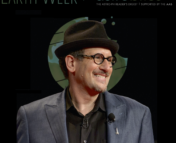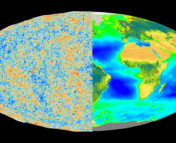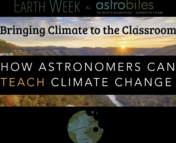Here we get some exclusive remarks from Dr. Kathryn Williamson (KW) and Dr. Travis Rector (TR) who hosted our first event (“Bringing Climate to the Classroom”) of the Earth Week x Astrobites 2022 series. You can find the recap of the event here, the recording of their presentation here (and accompanied closed captioning text), and their biographies here.
1) Could you please speak to your background/path and how it led to where you are today? Why are you invested in climate literacy/advocacy? If you were initially following a traditional academic path, could you please emphasize what that turning point was?
KW:
“I love astronomy and I love outreach, so I followed a mostly traditional path in the sense of going to graduate school and getting a degree. But a few years ago, I felt at odds with how much time I spent talking about black holes and gravitational waves compared to how much time I spend talking about climate change. In my personal life, I joined my local chapter of Citizen’s Climate Lobby and tried to do climate work outside of my regular job time. But as I made connections there, I started to see the ways I could incorporate some aspects of this work into my professional work. My turning point was the TED talk by Katharine Hayhoe that “The Most Important Thing You Can Do To Fight Climate Change is to Talk About It.” Obviously, I can’t lobby for a particular policy from my professional platform, but I can educate others on the science and create space for climate conversations to happen amongst my students and those I work with. I don’t have to share my opinion in these conversations, and I don’t have to have all the answers—I just have to create space and reach out to experts and make connections where I can. To realize this was very empowering.
Also, I started small. I was nervous about being vocal about climate change in Coal Country. I tried sharing it in the most basic way in my astronomy class, and I grew more and more confident the more I realized that most students wanted to talk about this.“
TR:
“I moved to Alaska about 20 years ago, and over that time we’ve seen changes that are unmistakable. Because of the ice-albedo feedback loop, the arctic is warming at three times the rate as the rest of the Earth. I found that students wanted to know what was happening. For example, when I lectured about Venus students wanted to know if that’s what the Earth’s future would look like. While I could assure them we weren’t going to turn into Venus, I didn’t have answers for their other questions, such as “What can we do?” or “Is it too late?”
I realized I needed to answer these as well. That was the turning point. Talking about climate change is different from other astronomy topics, because of the emotional component. People are angry, afraid, and sometimes without hope. So I started learning about how to help people process those feelings as well.“
2) How do you cope with eco-anxiety/existential dread? It is really easy to feel helpless—how do you overcome that?
KW:
“I’ve been thinking a lot about this one. I’m not sure I do it well. I don’t always feel motivated, and I don’t always act eco-friendly. I just do my best. Sometimes it means resting. This makes me think of the quote about how “we don’t need everyone doing climate change activism perfectly, we just need a lot of people doing it imperfectly,” so I try to be okay with that. I also think about the ending of “Don’t Look Up!” (spoiler alert) – when they are all sitting there around the dinner table reflecting on how “we really did have it all.” It reminds me to continue to turn back to my relationships with people and our planet and value all that I do have right now.
Also, in general, I think talking about our eco-anxiety and existential dread is important. There is a bit of a stigma against sharing your feelings in science and being “too emotional,” but I think a lot of people are working to break that stigma. It’s normal for us to have strong feelings about this work, and I find it empowering to be in community with other people who share my feelings, even if we don’t necessarily have all the solutions, we are trying and in it together.
Also, women! Women in climate change work are so inspiring to me. I love the book, “All We Can Save”, and the podcast, “No Place Like Home”. Also trying to learn more from Indigenous climate activists. The book “Braiding Sweetgrass” by Robin Wall Kimmerer has given me a new perspective on my relationship to all the non-human “people” in the world. It always helps me feel better to go on a walk in the woods and see all the trees and plants as part of my Earth family. Sometimes when the wind blows just right, it looks like the leaves are waving at me. It makes me smile, and it feels like a gentle encouragement from Earth.
Also, art. I worked with some local artists in my neighborhood to repaint a bear sculpture. I brought my astronomy and climate perspective and suggested the name “Ursa Gaia.” Different artists painted plants and animals in the state that are affected by climate change, and we posted information about each one to a Facebook page. I think it was a way to turn the doom and gloom into something beautiful and community-building. It was fun to see grandparents talking about the paintings with their kids on a random afternoon. People were learning about climate change and it wasn’t scary. It was empowering.”
TR:
“In 2014 I started to see a therapist to deal with what’s now called eco-anxiety. It felt hopeless- as my beloved state melted it seemed that no one noticed or cared. Nobody was talking about it- not even my astronomy colleagues. But that has all changed. People are taking it seriously. Now I find support and inspiration from all the amazing people, in astronomy and beyond, who are making it a priority. On bad days I still feel overwhelmed by it all, and on those days I find other things to focus on. But on the good days I look to see what I can do to make things better, acknowledging that I can fix everything but I can play my part. Someone recently said that if you’re feeling hopeless you’re not paying attention to all the good stuff going on. A lot of bad things are still to come, and we should grieve what we’ve already lost. But we also should feel optimism—there’s a lot of rational reasons to do so. So if you’re feeling overwhelmed join a group that shares your values that you can work with to make things better. Astronomers for Planet Earth (A4E) is a great group and I love being part of it.”
3) What do you wish that you knew early on when you were just beginning your research career? (General advice for young early career researchers who are thinking of switching paths).
KW:
“I wish I had known that it’s okay to be however you are, that there is a place for everyone. You don’t have to be an extrovert to do extroverted things, like organize large groups of people to climate action. Just make time to rest afterwards! ;)”
TR:
“When I was in grad school at the University of Colorado in the 1990’s (a terrible decade for music, BTW), the atmospheric sciences were part of our department. Almost daily I heard stories about catastrophic consequences that their models were predicting about climate change. Unfortunately much of that modeling has proven to be accurate. Sometimes I wonder if I should have switched to that program but I’m actually grateful I stayed in astronomy because it’s what I love most of all. Astronomers have a powerful voice, and a unique perspective on climate change. “There is no Planet B” is ultimately an astronomical message after all! I know many colleagues who have switched to doing research in climate change, and I applaud those that have switched- especially those who are working towards solutions. But if astronomy is your passion you should stay in it, and find the ways you can contribute.”
Thank you to Dr. Williamson and Dr. Rector for being part of our first Earth Week series here at Astrobites, and for teaching us about how we can effectively engage in climate conversations in academic settings!
Contact information:
Dr. Kathryn Williamson ([email protected], @AstroWilliamson)
Dr. Travis Rector ([email protected])
Edited by Ishan Mishra
Featured Image Credit: Headshots – Dr. Kathryn Williamson/Dr. Travis Rector; Logo – Suchitra Narayanan
This article was written as a part of our Climate Change Series. We’d love to hear what you would like to see from this initiative – if you have ideas, please let us know in this google form.




